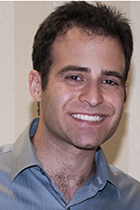
3:30 pm to 4:30 pm
NSH 1305
Abstract
Robots today are typically confined to operate in relatively simple, controlled environments. One reason for these limitation is that current methods for robotic perception and control tend to break down when faced with occlusions, viewpoint changes, poor lighting, unmodeled dynamics, and other challenging but common situations that occur when robots are placed in the real world. I argue that, in order to handle these variations, robots need to learn to understand how the world changes over time: how the environment can change as a result of the robot’s own actions or from the actions of other agents in the environment. I will show how we can apply this idea of understanding changes to a number of robotics problems, such as object segmentation, tracking, and velocity estimation for autonomous driving as well as various object manipulation tasks. By learning how the environment can change over time, we can enable robots to operate in the complex, cluttered environments of our daily lives.
Bio
David Held is an assistant professor in the Robotics Institute at CMU, working on machine learning for object manipulation, including perception and control. Prior to coming to CMU, he was a post-doctoral researcher at U.C. Berkeley working with Pieter Abbeel. He completed his Ph.D. in Computer Science at Stanford University with Sebastian Thrun and Silvio Savarese, where he developed methods for perception for autonomous vehicles. David has also worked as an intern on Google’s self-driving car team, and he has worked at the Weizmann Institute on building a robotic octopus. David has a B.S. and M.S. in Mechanical Engineering at MIT.
Additional Information
Host: Katharina Muelling
For Appointments: Stephanie Matvey (smatvey@andrew.cmu.edu)
